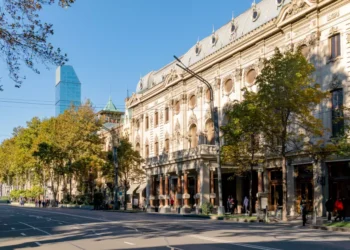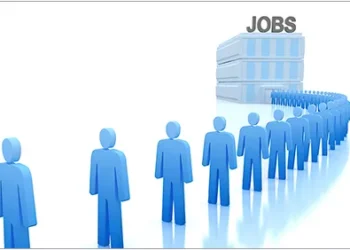On March 16, the Center for New Technologies, together with CENN and the company Esco-Es, hosted winemakers at the Bazaleti Green Technology Center. This was the first seminar from the Green Economy Program, which aims to promote the introduction of energy efficient and renewable energy production and utilization technologies in various industries.
At the meeting, industry experts presented challenges related to energy and possible solutions to them in the modern wine industry, and discussed aspects of energy insurance in the wine industry with business representatives. Esco-ES representatives Archil Papava and Givi Jakeli also talked about innovative technologies and new projects. Representative of the Green Council of Georgia, Levan Natadze, discussed the “green production niches”, winemaking procedures, and funding opportunities for winemakers, giving the attending businesspersons information about the specific technologies consumed by the wine sector.
In a conversation with Entrepreneur, Jakeli noted that “green” (sustainable) architecture has developed in the world, which implies not only one specific discipline, but also a unified approach and philosophy to life and the environment.
“Green technologies are already being introduced in Georgia, and the state should support their spread as much as possible,” he noted. “Some of the technologies shown today will be demonstrated by our organization by the end of May 2021, and we will offer these opportunities to the program participants with concrete examples.”
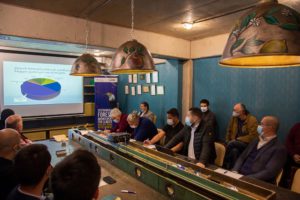
According to Zaal Kheladze, Director of the Center for New Technologies, their slogan is “From Traditions to Innovation,” because all traditions contain innovation. “If we remember the technologies that have been forgotten, it will be useful for our business. For example, specialists help us to get energy-efficient components which are compressed with technology and used in construction – waste that would normally be disposed of, but we use it to make different materials for building with,” he said.
One of the directions of the workshops is the generation of renewable energies, which turned out to be especially relevant for winemakers. This is biomass produced in the field of viticulture and winemaking, vine grains and so on, called “pressed chacha,” from which cheap fuel can be obtained and used for industrial purposes.
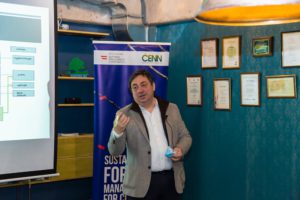
“Innovative technologies must suit the interests of the business and the profitability of their use,” Kheladze says. “Businesses will not be interested in technology that is more expensive than traditional technologies, but there are other factors involved: business responsibility, waste management, emissions reduction, compliance with environmental standards.
“Today, all this becomes a necessary condition for success in the European market, and we hope that such decisions will be encouraged by our national legislation.”.
“Our offers are based, on the one hand, on reducing investment and operating prices, and on the other hand, on increasing significant indirect benefits and preventing risks and losses. For example, we could not suggest a winery make fuel briquettes from vine husks and dry grape waste , because it would not be profitable. However, we can offer an oven that consumes chips made from the same raw materials cheaply, in this way, providing the wine production process with cheaper consumable energy, solving the problem of waste and, no less important, establishing the image of a “green product” producer in the local and European market,” continues Kheladze.
We asked Vakhtang Kochoradze, CENN representative and one of the initiators of the Green Economy Program, whether grape and wine production could be linked to forest and biodiversity conservation.
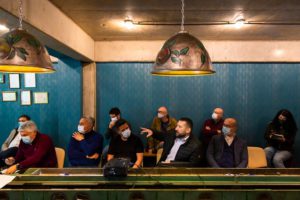
“When we talk about forest degradation, we must remember that it is the result of a specific activity, behind which there are specific market or household requirements,” Kochoradze tells us. “Unfortunately, for years, energy pressure has become a major factor in deforestation in Georgia that , and it continues to this day. Therefore, we need to find firewood alternatives in both households and the private sector. Responsible businesses can play a leading role in this process, and not only because “green technologies” are more accessible to business. This is becoming a trend already for the sale of their own products. In particular, our special interest in viticulture and winemaking is due to the large amount of biomass that is accumulates every year in the form of waste and wine production waste, which is then destroyed. As this poses additional risks in terms of environmental pollution, we think that the production of chips from this raw material is intriguing, also in terms of saving energy saving and the potential for independent commercial activity. Most importantly, the introduction of such a business experience will be a good example for households and will play a role in the implementation of rural energy solutions.”
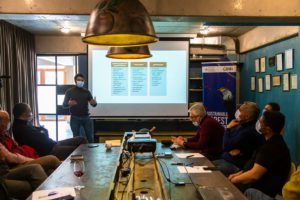
With the financial support of the Austrian Development Cooperation (ADC), CENN is implementing the project “Sustainable Forest Management for Rural Development” for the third year in a row, one of the goals of which is to develop and implement sustainable energy solutions. A good example of cooperation between CENN and NTC was the project implemented in February this year, which equipped all schools in Keda Municipality with modern heating systems in Adjara. The project was implemented with the financial support of the European Union and Austria. Solar panels and collectors, energy efficient stoves and boilers were installed, and thermal insulation and safety technologies were introduced, which, in the end, allows more energy to be generated using fewer resources.
The 15 companies participating in the recent workshop agreed that investing in energy technologies is justified in order to reduce costs in the long run and create a responsible, green business image.
“It is necessary for these technologies to be economically viable and not generating losses,” the winemakers agree. “On the contrary – these technologies will bring fewer costs to consumers.”
“Also important are the aspects of certification, which actually means the introduction of “green” technologies and the maintenance of the entire value chain so that the entrepreneur can reduce their costs. In some cases, the introduction of incentive legislation will be effective, which will push businesses to innovate in the field of energy.”
After the seminar, we asked Zaal Kheladze to evaluate it.
“We are talking about a reduction of operating costs by about 50%, if not more. In addition, it means less damage to the environment, which naturally accompanies traditional entrepreneurship in Georgia and around the world,” he tells us. “Today has been a pilot day for me and an attempt to move the building from energy efficiency to industrial, which, from today’s perspective, is clearly promising.”
“After interesting discussions, I feel we were able to show people what we wanted. In the future, we need to show this in action as well. This is also the purpose of organizing the Bazaleti Demonstration Center. It should be able to exist as a business and for that it should be interesting for different industries. In the near future, we plan to meet with specialists in the field of agriculture and medicine” continues Kheladze..
“With today’s seminar, our collaboration takes us to a new stage, which involves adapting an awareness campaign to different sectors – community, business, industry, buildings, and the education system.”
The Bazaleti Center for Engineering Technologies will open in May, after which trainings and seminars will become more intensive. A similar center is planned to be opened in Adjara in the future.
Translated by Ketevan Skhirtladze


